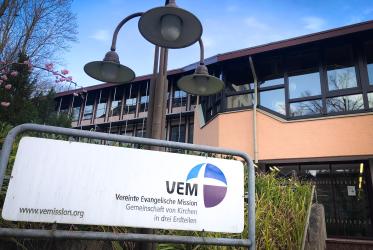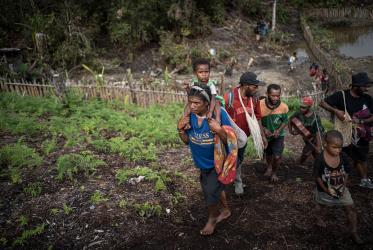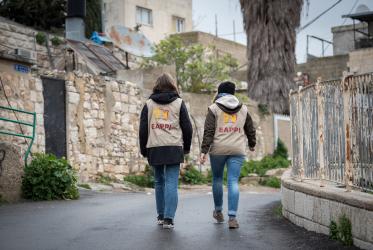The World Council of Churches (WCC) has been following and monitoring the situation in the Philippines for more than three decades. Over the years the WCC has been accompanying its member churches and the member Council - NCCP in their efforts to ensure justice and peace, protection of human rights and human dignity of the people of the Republic of the Philippines. The WCC has been deeply concerned on the deteriorating situation in the Philippines in all these years. From time to time, we conveyed our concerns to the respective bodies and authorities, and we voiced our concerns on several occasions about the worsening human rights situation in the country.
The Central Committee of the WCC which is a representative governing body of the global ecumenical fellowship with high profile leaders belong to its member constituency from different parts of the world in its last meeting held in Geneva in September 2006 devoted time to discuss once again about the deteriorating human rights situation in the Philippines. The members of the WCC Central Committee unequivocally condemned the extra-judicial killings in the Philippines and expressed grave concerns on the increasing militarization.
I have been meeting with various people and organizations in the country during the past four days along with a team of ecumenical delegates from different countries - Australia, Canada, Ghana, India, Japan, Korea and Thailand, We heard about the escalating fear and anxiety of people from different quarters that the situation will exacerbate with the implementation of the Human Security Act (HSA) enacted in July this year. I heard stories about how paramilitary groups armed by the military, and even members of the military and police have been involved and implicated in human rights violations especially in extrajudicial killings. During my meetings, it was shared that the government has increased its military action against insurgents resulting in an increase in the number of civilian deaths. As militarization in the Philippines has been on the increase the fear of the people are deepening. This fear of the people supported with my own information about the killings of several church workers and pastors in recent months including the brutal stabbing of Philippines Independent Church Bishop Alberto Ramento in October last year.
As the WCC Central Committee has expressed its grave concern on the alarming human rights situation in the country, I reiterate some of our concerns expressed and the Appeal, we made to the Philippines government that:
- An immediate and impartial investigation of all recent extrajudicial executions. We have been following the Report of the U.N Special Rapporteur Philip Alston and his observation that the "governments measures don't address the fact that the brutal killings are encouraged or facilitated by certain aspects of its own counter insurgency strategy". It is in this context we also share the concern and appeal to the government of the Philippines expressed by the Churches in the country that an independent inquiry commission to be set up to investigate the extrajudicial killings rather than one made up of the government appointees. At the same time, we hope not only for an investigation but to put an END to Extrajudicial killings.
- Our call is not to use the militarist approach in solving the problems - not just revising the military strategy for resolving the insurgency, but to ensure the resumption of the stalled peace talks between the government of the Republic of the Philippines and the National Democratic Front. In order to solve the insurgency, the government should address the root causes of the problems in the country, especially the long awaited land reforms and poverty alleviation which will lift up millions of Filipino masses who are struggling in their day to day life for freedom from hunger and poverty.
- It is our considered opinion that the Philippine government should take necessary action to stop the Enforced Disappearances in the country and the government should fulfill its obligations under the international human rights instruments and take immediate initiatives to ratify the International Convention of Protection of All Persons from enforced Disappearances.
- It seemed that the Philippines government is resorting to terrorist means in conducting its "war on terror". The Human Security Act (HSA) took effect recently, under the pretext of countering terrorism in the country or "war on terror", could have a negative impact in the Philippines society as many of its provisions are not in accordance with international human rights standards. As HSA defined terrorism broadly, it gives justification to put forth legal procedures and punishments for people branded as 'enemies of the state'.
- We condemn the ongoing practice of the Philippine government and the military of labeling and persecuting the churches, pastors and church workers who work for justice, peace and protection of human rights as subversives or communists.
While we reiterate our commitment to accompany the churches in the Philippines in their ongoing struggle for justice, peace and protection of human rights of all Filipinos, we assured the churches and the NCCP who stand with the poor and marginalized in their struggle that we will continue to be engaged in our global advocacy on Philippines human rights situation at all levels in the international arena.
During my recent meeting with the Secretary General of the U.N at its headquarters in New York, I openly appealed to the U.N Secretary General to his intervention in the precarious situation of the extra judicial killings in the Philippines. The WCC has a consultative status with the UN ECOSOC and in that capacity, we attend, monitor and participate in the discussions and debates at the U.N. bodies and also we accredit representatives from our constituencies to the UN Human Rights Council. While we continue this effort in collaboration and cooperation with other ecumenical organizations in WCC constituency and net works around the globe, WCC will continue to call the intervention of the HRC to look into the escalating human rights violations in the Philippines and this will be a priority engagement of WCC in the coming months. WCC will facilitate to present the cases of the human rights abuses in the country when the Philippines situation will be reviewed by the UN Human Rights Council in early 2008 through the new mechanism of the UNHRC - the Universal Periodic Review (UPR) process.
Again, I reiterate our commitment that the global ecumenical movement will continue to be in solidarity with the struggling Filipinos and their churches who are engaged in the ministries of prophetic witness and struggle for the marginalized and the poor.





